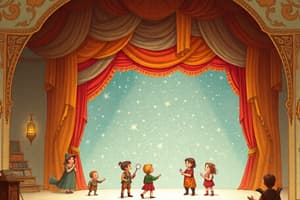Podcast
Questions and Answers
What age group is typically targeted by Children's Theatre?
What age group is typically targeted by Children's Theatre?
- 18 years and older
- 1 to 3 years old
- 3 to 11 years old (correct)
- 12 to 15 years old
Which of the following is NOT typically an element of Children's Theatre?
Which of the following is NOT typically an element of Children's Theatre?
- Direct address
- Audience participation
- Chorus
- Costume design (correct)
How does Theatre help build empathy and compassion?
How does Theatre help build empathy and compassion?
- By portraying various character experiences (correct)
- By reducing the need for teamwork
- By providing lectures on psychology
- By ensuring children memorize lines
What skill does participating in theatre help develop in children, similar to organized sports?
What skill does participating in theatre help develop in children, similar to organized sports?
What is a notable benefit of exposure to Theatre for children?
What is a notable benefit of exposure to Theatre for children?
Which benefit is associated with attending Theatre performances?
Which benefit is associated with attending Theatre performances?
What unique experience can children gain from participation in theatre?
What unique experience can children gain from participation in theatre?
What aspect of theatre helps children learn about listening and hard work?
What aspect of theatre helps children learn about listening and hard work?
What is one primary benefit of hand puppet play for young children?
What is one primary benefit of hand puppet play for young children?
What is the role of a dramatist or playwright?
What is the role of a dramatist or playwright?
How does drama help children with communication skills?
How does drama help children with communication skills?
What type of skills do children develop by playing the 'Detective Game' in drama classes?
What type of skills do children develop by playing the 'Detective Game' in drama classes?
What does role-play in drama classes prepare children for?
What does role-play in drama classes prepare children for?
Why is empathy emphasized as a benefit of drama?
Why is empathy emphasized as a benefit of drama?
Which of the following is NOT a focus of drama classes as mentioned?
Which of the following is NOT a focus of drama classes as mentioned?
What does imaginative play help children distinguish?
What does imaginative play help children distinguish?
What distinguishes a myth from other folklore genres?
What distinguishes a myth from other folklore genres?
Which genre is characterized by narratives set in human history and demonstrating human values?
Which genre is characterized by narratives set in human history and demonstrating human values?
What defines non-fiction stories?
What defines non-fiction stories?
What is a characteristic feature of board books?
What is a characteristic feature of board books?
What is the purpose of predictable books in early childhood reading?
What is the purpose of predictable books in early childhood reading?
Which of the following best describes wordless books?
Which of the following best describes wordless books?
How is historical fiction commonly understood?
How is historical fiction commonly understood?
What benefit does early exposure to music provide in terms of vocabulary?
What benefit does early exposure to music provide in terms of vocabulary?
Which of these literary classifications is based purely on imagination?
Which of these literary classifications is based purely on imagination?
Which of the following is NOT highlighted as a benefit of music exposure for children?
Which of the following is NOT highlighted as a benefit of music exposure for children?
Why is music intelligence considered important by Howard Gardner?
Why is music intelligence considered important by Howard Gardner?
How does learning an instrument affect a child's social skills?
How does learning an instrument affect a child's social skills?
What cognitive functions does music stimulate in children's brains?
What cognitive functions does music stimulate in children's brains?
What is a key reason for why music aids in building confidence in children?
What is a key reason for why music aids in building confidence in children?
Which aspect is NOT directly improved by exposure to music?
Which aspect is NOT directly improved by exposure to music?
What is a recommended approach for helping children adapt socially?
What is a recommended approach for helping children adapt socially?
What is primarily emphasized as the greatest value in art for children?
What is primarily emphasized as the greatest value in art for children?
How does creating art help children express their emotions?
How does creating art help children express their emotions?
What is one benefit of arts for children with disabilities?
What is one benefit of arts for children with disabilities?
What can art activities improve in children, according to some studies?
What can art activities improve in children, according to some studies?
Which of the following describes the role of creativity in art as discussed?
Which of the following describes the role of creativity in art as discussed?
What common misconception about children's art is highlighted?
What common misconception about children's art is highlighted?
Why is socialization through the arts significant for nursery children?
Why is socialization through the arts significant for nursery children?
What should parents focus on regarding their child's artistic endeavors?
What should parents focus on regarding their child's artistic endeavors?
What type of music are school-age children typically intrigued by?
What type of music are school-age children typically intrigued by?
How do teenagers often use musical experiences?
How do teenagers often use musical experiences?
What is a primary focus of children's museums compared to traditional museums?
What is a primary focus of children's museums compared to traditional museums?
What philosophy do children's museums embrace?
What philosophy do children's museums embrace?
What role do children's museums serve within a community?
What role do children's museums serve within a community?
What sets children's museums apart from other types of museums?
What sets children's museums apart from other types of museums?
What is a significant implication of the rise of children's museums in the U.S.?
What is a significant implication of the rise of children's museums in the U.S.?
How do contemporary museums aim to change their approach?
How do contemporary museums aim to change their approach?
Flashcards
Myth
Myth
A type of folklore narrative, often supernatural, explaining cultural practices or natural phenomena.
Legend
Legend
A folklore narrative about human actions in history, showcasing human values and seeming truthful.
Fiction
Fiction
A story or setting based on imagination, not facts or history.
Historical Fiction
Historical Fiction
Signup and view all the flashcards
Non-fiction
Non-fiction
Signup and view all the flashcards
Board Books
Board Books
Signup and view all the flashcards
Predictable Books
Predictable Books
Signup and view all the flashcards
Wordless Books
Wordless Books
Signup and view all the flashcards
Children's Theatre Focus Age
Children's Theatre Focus Age
Signup and view all the flashcards
Theatre's Educational Value
Theatre's Educational Value
Signup and view all the flashcards
Theatre & Empathy
Theatre & Empathy
Signup and view all the flashcards
Theatre & Teamwork
Theatre & Teamwork
Signup and view all the flashcards
Theatre & Character Development
Theatre & Character Development
Signup and view all the flashcards
Performance Conventions
Performance Conventions
Signup and view all the flashcards
Benefits of Theatre Participation
Benefits of Theatre Participation
Signup and view all the flashcards
Theatre's Role in Learning
Theatre's Role in Learning
Signup and view all the flashcards
Music and Brainpower
Music and Brainpower
Signup and view all the flashcards
Music and Social Skills
Music and Social Skills
Signup and view all the flashcards
Music and Confidence
Music and Confidence
Signup and view all the flashcards
Music and Motor Skills
Music and Motor Skills
Signup and view all the flashcards
Music and Language
Music and Language
Signup and view all the flashcards
Music Intelligence
Music Intelligence
Signup and view all the flashcards
Music and Emotional Skills
Music and Emotional Skills
Signup and view all the flashcards
Music and Physical Development
Music and Physical Development
Signup and view all the flashcards
Children's Museums
Children's Museums
Signup and view all the flashcards
Interdisciplinary Education
Interdisciplinary Education
Signup and view all the flashcards
Client-centered Philosophy
Client-centered Philosophy
Signup and view all the flashcards
Museum Collections as Teaching Tools
Museum Collections as Teaching Tools
Signup and view all the flashcards
Traditional Museums vs. Contemporary Museums
Traditional Museums vs. Contemporary Museums
Signup and view all the flashcards
Children's Museums and Other Museums
Children's Museums and Other Museums
Signup and view all the flashcards
Roles of Children's Museums
Roles of Children's Museums
Signup and view all the flashcards
Every Children's Museum is Unique
Every Children's Museum is Unique
Signup and view all the flashcards
Art & Emotional Expression
Art & Emotional Expression
Signup and view all the flashcards
Art & Creativity
Art & Creativity
Signup and view all the flashcards
Art & Self-Esteem
Art & Self-Esteem
Signup and view all the flashcards
Art & Socialization
Art & Socialization
Signup and view all the flashcards
Art & Language Skills
Art & Language Skills
Signup and view all the flashcards
Art's Value: Process over Product
Art's Value: Process over Product
Signup and view all the flashcards
Art for Non-Verbal Children
Art for Non-Verbal Children
Signup and view all the flashcards
Art's Inclusiveness
Art's Inclusiveness
Signup and view all the flashcards
Imaginative Play
Imaginative Play
Signup and view all the flashcards
Fantasy vs. Reality
Fantasy vs. Reality
Signup and view all the flashcards
Dramatic Play
Dramatic Play
Signup and view all the flashcards
Drama (Definition)
Drama (Definition)
Signup and view all the flashcards
Role-Play
Role-Play
Signup and view all the flashcards
Clear Diction
Clear Diction
Signup and view all the flashcards
Empathy (in Drama)
Empathy (in Drama)
Signup and view all the flashcards
Drama (Benefits for Kids)
Drama (Benefits for Kids)
Signup and view all the flashcards
Study Notes
Lectures on Reading of Basic Science in English
- Prepared by Dr. Sapah Yoseef and Dr. Nourhan Bahgat, both from the Faculty of Education for Early Childhood, Cairo University.
Table of Contents
- Chapter 1 (Children's books): Pages 5-37
- Chapter 2 (Reading in Art-Music-Museum): Pages 39-62
- Chapter 3 (Teacher's role in using Children's books, Theatre, Drama, Art, Music, and Museum): Pages 63-101
- References: Page 103
Chapter 1 (Children's books)
- Introduction: Childhood is crucial for societal development.
- What is a children's book?: It is material for children and young adults, encompassing all genres and formats.
- Importance of children's books: They help children in communication, increasing observation, developing intelligence, curiosity, and imagination. They also help children learn about cultural heritage.
Chapter 2 (Reading in Art-Music-Museum)
- This chapter discusses various reading methods that can be used in Art, Music, and Museums.
- The chapter focuses on different styles of reading, including various aspects of reading in art, music, and museums.
Chapter 3 (Teacher's role in using Children's books, Theatre, Drama, Art, Music, and Museum)
- Role of the kindergarten teacher: Crucial in the first six years of a child's life, shaping personality, and fostering essential skills in social, emotional, linguistic, and moral domains.
- Using children's books: Effective techniques for presenting stories and engaging children, such as appropriate book handling, choosing suitable books, and creating an environment where the child is the active learner..
- Role of Teacher in using theatre: Puppets are useful for capturing children's attention, developing oral language, social-emotional skills, and motor skills, particularly in promoting confidence, creativity, and self-expression.
- Role of the teacher in using art: Teachers should use art as a tool for fostering cognitive development, creative expression, and emotional development. Different art activities (cut and glue, stickers, oil pastels, marble paintings, water balloon painting, and mask making) can help grow fine motor skills and emotional control in children.
- Role of the teacher in using music: Music plays a crucial role by stimulating cognitive, social-emotional, and physical growth while helping children practice important skills such as motor coordination, understanding emotions, literacy, and language.
- Role of the teacher in using Museums: Museums provide a unique opportunity to develop a child's skills and understandings. Important tactics include using conversation, making activities relevant, providing multidimensional learning experiences, selecting books that suit age, and incorporating creative tools.
References
- Compiled list of resources cited throughout the lectures.
Studying That Suits You
Use AI to generate personalized quizzes and flashcards to suit your learning preferences.




